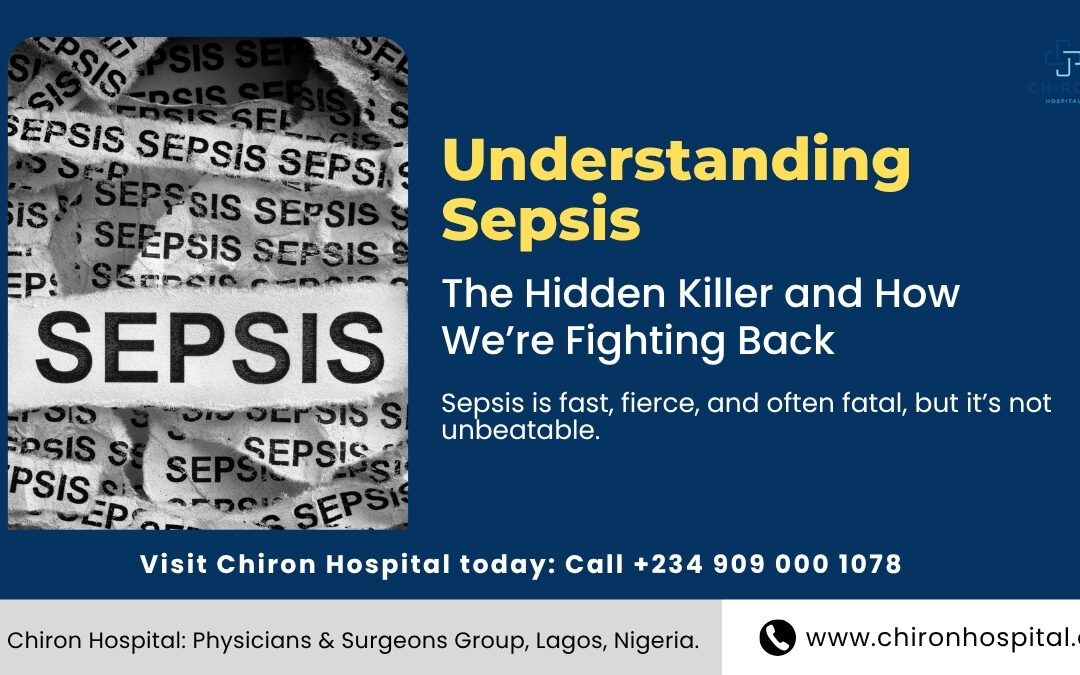The Illness That Sneaks In and Shuts Down the Body .
It often begins like something small, a fever, a wound, an infection you think will pass. But within hours or days, it can turn into something life-threatening. That’s what makes sepsis so dangerous: it hides in plain sight. Sepsis is the body’s extreme response to infection. Instead of fighting just the germs, your immune system begins attacking your own tissues and organs. Without rapid diagnosis and treatment, sepsis can cause organ failure, shock, and even death.
At Chiron Hospital, we treat sepsis cases almost every week, many of them arriving too late. This blog isn’t just to inform you; it’s to help you recognize sepsis early, take it seriously, and seek immediate care when it matters most.
A Mother’s Fight: When Sepsis Complicates Childbirth
Bukola was 32 and healthy when she went into labor with her second child. Everything seemed routine, until after delivery, when she developed a persistent fever and abdominal pain. Nurses initially suspected a mild infection. But within 24 hours, her condition deteriorated rapidly. Bukola became disoriented, her heart rate spiked, and her breathing turned shallow. Her husband, panicked and confused, rushed her back to the hospital. By then, her organs had begun to shut down, a textbook case of postpartum sepsis.
At Chiron Hospital, our ICU team immediately began fluid resuscitation, blood cultures, and IV antibiotics. The source was a retained placenta fragment that caused an infection. She spent six days in intensive care, closely monitored by our obstetric and critical care specialists. Today, she’s not only alive but thriving. but only because she got help in time.
Why Sepsis Is So Hard to Spot
Sepsis doesn’t always come with sirens. It can mimic common infections, and many patients especially in Nigeria, delay care due to cost, distance, or lack of awareness. Some don’t even know the term “sepsis” exists until it’s too late. The early signs can include:
- Rapid heartbeat
- Fever or very low body temperature
- Confusion or disorientation
- Difficulty breathing
- Severe pain or discomfort
- Shivering or feeling very cold
In later stages, patients may lose consciousness, experience organ failure, or go into septic shock. Time is everything.
How We Fight Back at Chiron Hospital
At Chiron Hospital: ICU & Surgical Centre, we approach sepsis like the emergency it is. Our protocols are built on rapid response and multidisciplinary care. The moment a patient presents with symptoms suggesting sepsis, our ICU team swings into action. We don’t just treat the infection; we stabilize the patient’s organs, monitor blood pressure, support breathing, and track every vital sign. Quick access to labs, imaging, and broad-spectrum antibiotics makes the difference between life and death. We also emphasize education for our staff, our patients, and the public. Because fighting sepsis doesn’t start in the ICU, it starts in recognizing symptoms early and acting without delay.
What You Can Do
Sepsis can affect anyone, the young, the elderly, the healthy, the sick. But you can reduce your risk by:
- Treating infections promptly and completely
- Practicing good hygiene and wound care
- Staying up to date with vaccinations
- Knowing your body and seeking care when symptoms feel “off”
Final Thoughts
Sepsis is fast, fierce, and often fatal, but it’s not unbeatable. Stories like Bukola’s remind us that lives are saved not just by machines and medicine, but by timing, awareness, and the will to fight back. At Chiron Hospital, we’re here to help you win that fight.
Need emergency care?
Call us now: +234 909 000 1078 Email: admin@chironhospital.org 🌐 Visit: www.chironhospital.org
#SepsisAwareness #ChironCares #EmergencyCareLagos #ICUinLagos
#SaferBirths #MaternalHealth #ChironHospital #NeonatalCare #EveryMotherMatters #EveryBabyMatters #ICUCare


Recent Comments